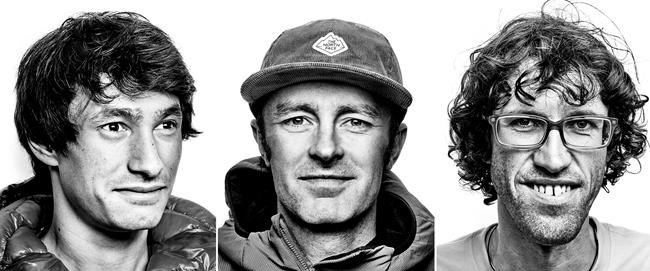
American Jess Roskelley (centre) and Austrians David Lama (left) and Hansjorg Auer (right) are shown in these handout photos. The bodies have been recovered of the three renowned mountain climbers who were believed to have been caught in a large avalanche in Banff National Park last week. THE CANADIAN PRESS/HO-The North Face, *MANDATORY CREDIT*
Republished April 22, 2019 - 3:57 PM
Original Publication Date April 22, 2019 - 1:46 PM
The treacherous recovery of three world-class climbers in Alberta's Banff National Park involved a helicopter, a search dog and 28 people, Parks Canada said Monday as it released details of its rescue efforts.
American Jess Roskelley and Austrians David Lama and Hansjorg Auer disappeared last week while attempting to descend the east face of Howse Peak in the Icefields Parkway.
The men's bodies were recovered Sunday.
Brian Webster, visitor safety manager at the park, said the men began their climb Tuesday morning and summitted the 2,300-metre mountain by noon.
The avalanche hit while the climbers were making their 1,000-metre descent that afternoon, he said. Their bodies were found at the bottom of the mountain's east face.
"Anybody involved in an avalanche of that magnitude — it's going to be a bad outcome," Webster told reporters. "There is no amount of skill set that is going to increase your ability to survive an avalanche like that."
Roskelley climbed Mount Everest in 2003 at age 20. At the time, he was the youngest American to climb the world's highest peak.
Lama, 28, was feted for achieving the first free ascent in 2012 of the Compressor Route of the Cerro Torre, one of the most striking peaks in the Andes. The feat was captured in the 2013 documentary "Cerro Torre — A Snowball's Chance in Hell."
And the 35-year-old Auer became the first person to free solo climb Italy's Marmolada peak via the south face in 2007.
Incident commander Shelley Humphries said visitor safety specialists responded immediately Wednesday when the trio was reported overdue, and climbing equipment and evidence of multiple avalanches was found in the area.
Although the three climbers were not wearing avalanche beacons, Humphries said a transceiver was dropped so crews could later locate the site.
Further search efforts were put on hold for three days because of bad weather and avalanche conditions.
The bodies were found after an avalanche dog and its handler were deployed to the area by helicopter, said Humphries.
Howse Peak, located in the northernmost corner of Banff, is remote and can only be accessed by skiing in. Parks Canada said its mixed rock and ice routes make it an exceptionally difficult climb.
Webster called the recovery of the men's bodies complex because of the strong winds, snow and high avalanche conditions.
"(Another) factor that made this particular search more challenging is that the climbers were not wearing avalanche transceivers," he said.
"So, when we got on site to do the search, we weren't able to hone in on them directly and we had to utilize random probing and the search dog."
Humphries said while she understands it's common for professional climbers not to wear beacons, Parks Canada strongly recommends carrying the equipment.
"In this particular case, the outcome would not have changed, but it would have expedited the search and recovery," she said.
So far this winter, Webster said there have been six avalanche fatalities in Banff and Yoho national parks.
He said that figure includes a death in Yoho over the weekend.
Parks Canada has said a man, who was among a party of three backcountry skiers, was involved in an avalanche Saturday afternoon on Des Poilus Glacier and died Sunday in hospital.
News from © The Canadian Press, 2019